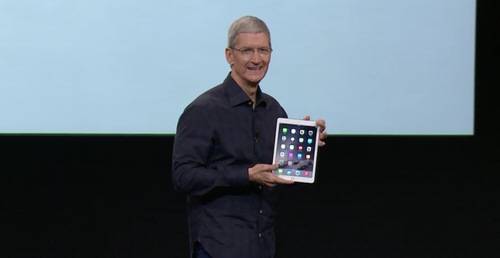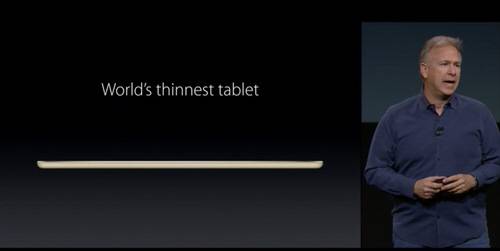
As expected, Apple has refreshed its iPad line with a new iPad Air 2, the company’s thinnest and fastest tablet to date.
The super-skinny iPad Air 2 measures 6.1 mm thick and offers, among other things, TouchID. The new hardware component will help secure certain apps and the tablet itself with fingerprint recognition security. It also makes the iPad ripe for Apple Pay, which will also come to the tablet.
In addition, Apple executive Phil Schiller emphasized that the new tablet will offer extremely low reflectivity to kill typical touchscreen glare. Then he boasted about a few more things. The iPad Air 2 features a new A8X, next-generation processor designed specifically for the tablet. Schiller claims the new iPad and its 64-bit architecture offers the fastest performance yet.

Other additions: Motion co-processor, new barometer, 802.11 ac/MiMo support for faster WiFi, new HD selfie camera with larger 2.2 aperture, and 8MP iSight camera, 1080p HD capture, with burst-mode, time-lapse, and slow motion—just like the new iPhones can do.
Pricing starts at $499 for 16GB; cellular versions cost $130 more.
Schiller slipped in an iPad mini announcement: The new generation of the company’s compact tablet will also get TouchID. The iPad mini 3 will sell for a starting price of $399 (up to $599, depending on storage capacity). Budget shoppers will love that the company’s hanging onto the older tablet models, but cutting those prices by $100, to offer cheaper options. Last year’s iPad mini will start at just $299.
All tablets will be available silver, space grey and a new gold color. Pre-orders begin tomorrow, with shipping starting at the end of next week.
Many people suspected many of these announcements were coming. And if they didn’t, Apple’s accidental leak of its own iPad product info yesterday basically sealed the deal.
iPad sales have been slowing quite a bit recently, though you wouldn’t know that from Apple’s event. According to CEO Tim Cook, Apple sold more iPads in the first four years than any other product in its history. It sold “225 million iPads around the world,” and 675,000 apps designed especially for it now exist.
Photo by Apple

















